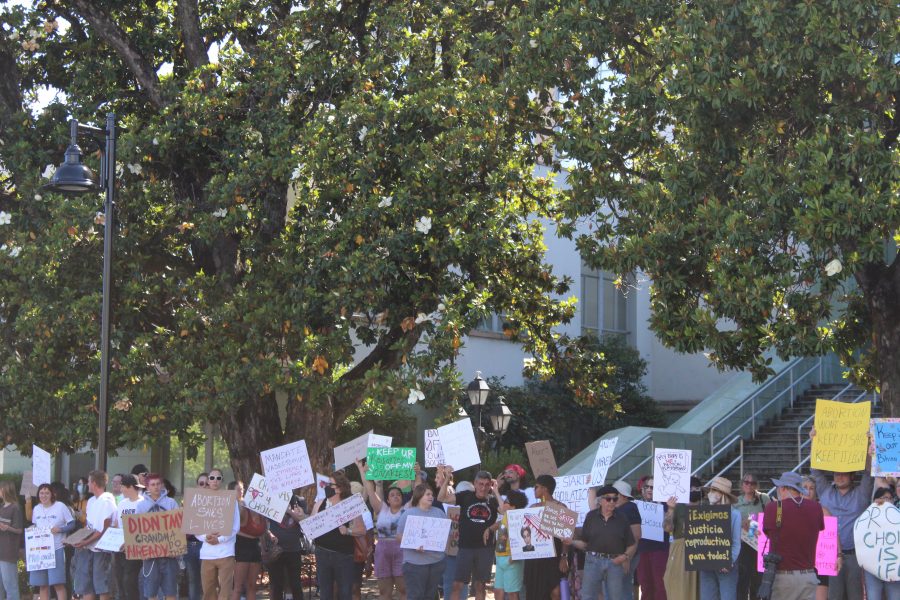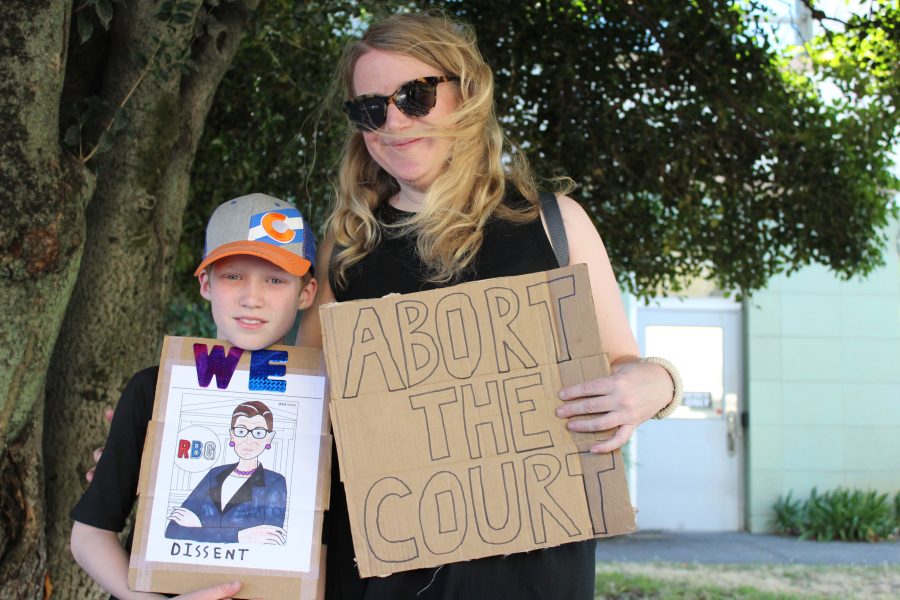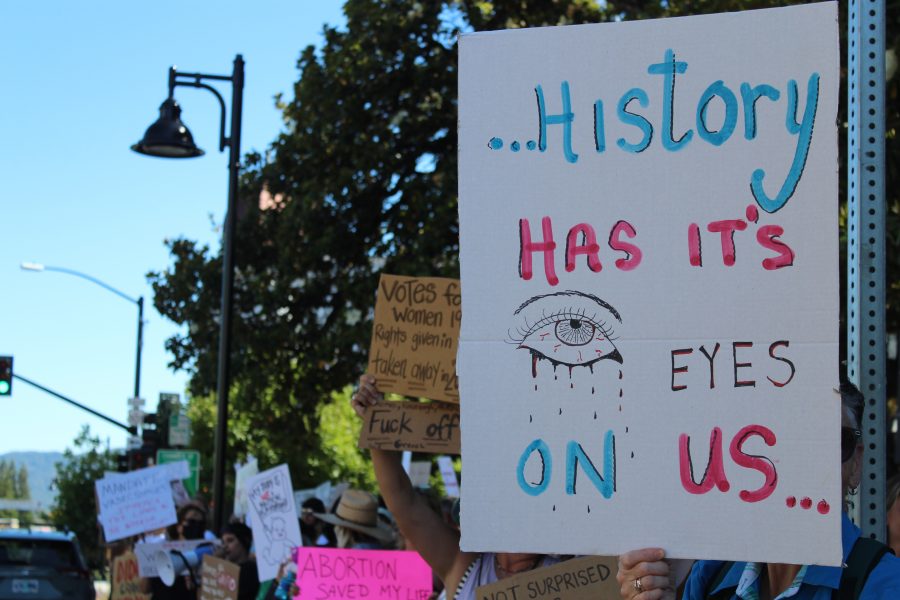In conversation with pro-choice protesters in California and Texas

Jamie Speka talks to residents in California and Texas as they protest against the US Supreme Court’s decision to overturn Roe v. Wade.
Following the overturning of the Roe v. Wade case by the US Supreme Court, the already polarised nation becomes engulfed in a convoluted battle between Church and State. Demonstrations across the country have erupted with a prevalent, collective goal in mind: secure safe and reliable abortion accessibility for all.
The timeline leading to the current events involves a robust network of players, time, laws, and circumstances. Roe v. Wade began its rumbles in 1970 when Jane Roe first filed suit against the Dallas County District Attorney in Texas. Three years later, the lawsuit was concluded favouring Roe’s main argument of an individual’s right to liberty under the 14th amendment in addition to the right to privacy as it extends to an individual’s control over pregnancy. The court also acknowledged state rights mechanizing some state regulations to be allowed and dependent on trimesters.
Significantly, this case characterized abortion in the U.S as being covered under the constitutional right to privacy. Furthermore, it historically changed the power that states have over abortion regulation.
The court’s decision relies on originalism. Unenumerated rights – sometimes known as unwritten rights – are included in the constitution via the ninth amendment as a way to acknowledge that the list of laws is not exclusive. The Court has long held the right to privacy as one of these unenumerated rights. The right to liberty – as described in the 14th amendment – is also what gave abortion rights a victory. However, the current Court believes that the drafters did not intend for the right to liberty in the 14th amendment to overpower a State’s legislation.
The current Court believes that the drafters did not intend for the right to liberty in the 14th amendment to overpower a State’s legislation
Equally, “liberty” is applied broadly to contemporary society, one that is very different from the society from when the constitution was written. This leaves way for justices to argue that the drafters did not intend for the right of liberty in a historic context to be applied to abortion rights. Justices now state that liberties can only be applied to unenumerated rights such as privacy that are “deeply rooted in this Nation’s history and tradition”. This interpretation rests on contemporary society being guided by traditional views on abortion.
Large-scale anger from the court’s ruling is manifestly identifiable. Fifty-six per cent of U.S adults opposed the court’s decision. Along with those Americans are the three justices of the dissenting opinion who jointly remarked on the decision that “To allow a State to exert control over one of the most intimate and personal choices [an individual] may make is not only to affect the course of their life, monumental as those effects might be.”
To that, we turn to the voices of the American people who now face these monumental effects. In zooming in on individual voices, one can glean the deeply distressing, subjective, experiences that gather when faced with this transformative ruling.

At a protest within a small town in Northern California, an array of homemade signs populate the spaces above heads. It is here where hundreds of Americans express their disdain for the court’s ruling.
“It means a lot to be here,” comments Roseli Nuñez, an 18-year-old Ukiah native. “I was very angry when this hit the news. It’s my first protest and my parents don’t know I am here–I am doing this behind their back.”
Nuñez’s parents are against abortion as they hold conservative views. Generational differences abound concerning abortion rights. To Nuñez, these beliefs are inevitable, yet not a reason to suppress a voice.
“I am fighting for a better future. I am fighting for those who can not get out here and protest safely. If I ever have kids, hopefully by the time they are adults they will be able to make their own decisions on abortion when the time comes. A lot of this is for them.”
At the protest, many young people proudly display their signs. Beau Decker, an 8-year-old is here with his mother, Kelly Pollard.
“This is our second protest in Ukiah. It’s really important. I have two young boys who I take with me to these events. It’s important to see men at these protests because this is a human rights issue. This decision has outcomes on all of our futures,” says Pollard.

Alycia Macabre, the protest organiser, explains the significance of protests regardless of region.
“We are a nation and if we do not stand with the other states that do not have the same rights we have, then what are we standing for? That is the whole point of the protest. I want everyone’s voices to be heard. A lot of us feel helpless because we are in a state where a lot of us are given the right to an abortion, but we are standing up for the people with uteruses who can not stand up for themselves. We are here for those who do not have these rights. We are a nation.”
California has become a sanctuary for those unable to find access to abortion in their states. Nevertheless, travel to different states when in need of abortion access is not ideal, especially for marginalized groups unable to afford the cost and complications that arise from travel. These protesters remind us that even as a state permits abortion, it does not negate the national decision that places abortion out of reach for thousands of individuals.
Turning to Texas – a state historically set on banning abortion – views remain the same, albeit, more frantic.
“Out of the young people I went to school with, there is a great deal of fear and fury. There’s been a massive influx of pro-choice posts on Facebook, Instagram, and Twitter regarding the direction our state is headed in” says Texas native, Brittany Grether. “None of the outrage from the younger generation is being received well by the older population. Personally, I’ve gotten into a number of arguments regarding human rights with those of older generations.”
Grether reminds one that with the sheer amount of gerrymandering in Texas, it will be difficult for minorities to dictate the laws of the state. Although 53 per cent of the state opposes the Court’s decision, legislators have been set on regulating abortion since before the decision was solidified.
Taylor Bowser, a resident of Texas, looks beyond Roe v. Wade, expressing his fear of what the Supreme Court could do next.
“I’m mostly dismayed at how it could threaten trans healthcare since that’s also a private medical decision people in Texas want to overturn,” says Bowser who is in the midst of undergoing his own transition.

The right to privacy is not only an underlining factor that won the case for just Roe. Obergefell V. Hodges (2015) legalized gay marriage; Griswold V. Connecticut (1967) gave the right to buy and use contraceptives; and, Lawrence V. Texas (2003) struck down the criminalization of same-sex intimacy.
An attorney with the Human Rights Campaign, Cathryn Oakly, worries that LGBTQ+ healthcare is under threat as the Court reconsiders other Due Process Rights. “The LGBTQ+ community relies on reproductive health care. LGBTQ people seek and receive abortions, they seek and receive and use contraception,” Oakley comments for NBC News.
Along with contraceptives, states like Alabama and Texas are already urging for a strike down of legislation that protects gender-affirming care for trans youth as many believe trans healthcare is not “deeply rooted” within the nation’s history.
Bowser not only fears that this will affect his general well-being, but that it also is indicative of larger concerns against human rights. “With all the censorship of queer theory and identity and black history, it really feels like this decision shows that the government is leaning towards government control of the people in a scary way,” he comments.
I’m mostly dismayed at how it could threaten trans healthcare since that’s also a private medical decision people in Texas want to overturn
Taylor Bowser, Texas resident
Derecka Purnell, a human rights lawyer, writes in a commentary for The Guardian: “Decisions like these also lead to material losses beyond individual privacy rights and bodily autonomy. Institutions and individuals benefit from our loss of agency[…] forcing pregnancy by restricting abortion access, and creating hostile conditions to discourage pregnancy–keeps people who can become pregnant in a precarious position, subject to the whims of others.”
While this decision affects the agency of all people, it is no surprise that marginalized individuals will be facing the largest challenges.
According to the American Civil Liberties Union (ACLU), pregnancy-related deaths would grow an estimated 33 per cent for Black Americans. Veronica Fowler of ACLU explains that “everything affecting the white population affects the Black population even more due to things such as systemic racism, lower income, job opportunities, and reliable transportation.”
The blurring of lines between Church and State is becoming far more prevalent within the current political paradigm. Ideologies on societal codes of conduct materialize systemically, instigated by Puritanical beliefs that the country is founded on. Due to this, interpretations of the law become entrenched within ideologies that withhold biases. Never is such an issue brought out so tremendously than with an institution held aside from democratic input–whereby, justices responsible for defining the rights of a nation are contingent upon party ideals.
In the face of displacement, protesters dream of a more inclusive future. “It takes a whole lot of hope to be here protesting,” Macabre comments. “It seems like things are going downhill quickly. All of us are holding on to a little ounce of hope to push us further. That’s all anyone can really do when they are out here. It takes courage to have hope.”


